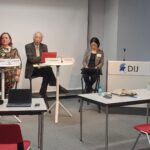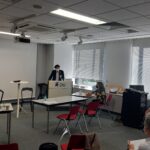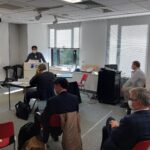Co-organizer
Supported by


Registration Info
This is a past event. Registration is no longer possible.
DIJ Mailing List
Please subscribe below to stay informed about our research activities, events & publications:
Ageing and long-term care in German and Japanese communities
November 11, 2022
Organizing team
Hiroko Kudo, Chuo University
Tomoo Matsuda, Mitsubishi Research Institute
Gerd Naegele, TU Dortmund
Franz Waldenberger, German Institute for Japanese Studies (DIJ)
Co-organizing institutions
Friedrich Ebert Stiftung, Tokyo
Japanese German Center Berlin (JDZB)
This workshop brought together the German and Japanese authors of the book project Ageing and Elderly Care in German and Japanese Communities. The aim was to discuss the findings of the book project, to comment on each other’s contributions, and to explore promising areas for possible future inquiries.
Following the structure of the book, the workshop was divided into five sections. In the first section, Gerhard Igl (University of Kiel) highlighted the competences of Japanese municipalities in the field of care and emphasised that some of this was not possible in Germany for constitutional reasons. He also outlined the changes in the care system in Germany and referred to the regionalisation efforts in the current coalition agreement. Hiroshi Yoshida (Tohoku University) asked the German side questions about regular evaluations in care, which take place every three years in Japan, and about care support for families, which has never been introduced in Japan. This was followed by an exchange on the benefits of decentralised care and the care allowance.
The second section covered civic engagement and inclusion. Gerd Naegele emphasised the optimistic orientation of the Japanese contributions and showed particular interest in the aspect of thinking of demographic decline also as an opportunity. Ikuko Fujita wondered why the proportion of people cared for at home was so high in Germany at 80% and was interested in the role of financial incentives in this. Tomoo Matsuda discussed how to increase volunteering and pointed out the importance of autonomy. He emphasised that there were different groups of elderly people and that one had to try to keep those who were still active mobile. A lively discussion followed about the feasibility of caring communities and possibilities of digital support to improve the care situation at community level.
In the third part of the workshop, the changes to life in care due to the COVID pandemic were discussed. The different ways of dealing with the crisis in Germany and in Japan showed that there had been “collateral damage” in both cases, even though Japan had come through the pandemic with lower numbers of victims. The question arose as to what could be learned from this for other crises. As a result of the pandemic, dormant resources in society had come to the surface, but also problems, and in some cases profound changes in lifestyle had occurred. In addition, age-discriminatory aspects of the pandemic management were emphasised, because a population group above a certain age was classified as risk patients, although gerontology, at least in Germany, had argued against such negative simplifications of age for a long time. Finally, longer-term perspectives on the effects of the pandemic were given: for example, some municipalities would now be more sensitive in their handling of such crises, and there might now also be greater openness towards digital aids.
The fourth section addressed the shortage of nursing staff in the two countries. The Japanese side was interested in issues of training and care leave in Germany and why it was rarely taken up. The German side outlined the situation of care workers and asked about the importance of the Japanese ie system as well as the municipal level in Japan. In the discussion about caregiver leave, it became clear that there were class-specific differences and that caregiving was often perceived as a taboo subject in companies. The role of Japanese municipalities was discussed in the context of voluntary commitment, which would not be unusual for care institutions. In addition, chiiki hokatsu shien senta (community-based integrated care centres) help with coordination and counseling for older persons.
In the last thematic section, the focus was on technological innovation. Here, the German researchers focused on questions of data protection and the possibilities of preventing misuse – especially in connection with technical devices that would scan the user’s movements. Further questions were: What role does the autonomy of the elderly play, and how easy is the technology to use? The Japanese side noted that the networking of data has not yet been effectively achieved in Japan. Mihoko Niitsuma (Chuo University) wondered how to take into account the perspective of all stakeholders in the development in order to be able to produce any robots that fit as closely as possible. The different attitudes towards robots in Japan and Germany were also discussed. There was agreement that robots have the potential to replace what humans cannot, but also vice versa.
In the final discussion, Franz Waldenberger summarised the most important concepts of the workshop: communalisation (realised in Japan, under discussion in Germany), cash benefits, community (local care structures), self-determination of those in need of care and family structures. The question arose to what extent one could adopt something of Japan’s community-centred perspective for Germany. In addition, the dialogue had shown that there were different possibilities for the inclusion of older persons but also of technologies in the field of care and that these perspectives should be pursued further in the future. It was particularly stimulating that far more points could be addressed in the course of the discussions than could be found in the book. The engagement with robotics also raised questions about the applicability of technology: Can robotics be a permanent solution to the problems of care, or do other fundamental changes need to be made? Hiroko Kudo concluded the workshop, which was characterised by intense intellectual exchange and should serve as a successful stimulus for further mutual learning.
Programme outline
09:00 Welcoming remarks
Franz Waldenberger
09:10 Session 1: The role of communities in long-term care
- German side: Gerhard Igl
- Japanese side: Hiroshi Yoshida
- Moderator: Gerd Naegele
10:10 Session 2: Civic engagement and inclusion
- German side: Gerd Naegele
- Japanese side: Ikuko Fujita and Tomoo Matsuda
- Moderator: Franz Waldenberger
11:10 Break
11:30 Session 3: The impact of the COVID pandemic
- Japanese side: Norio Okada
- German side: Martina Brandt
- Moderator: Hiroko Kudo
12:30 Lunch
14:30 Session 4: Coping with labor shortages in elderly care
- Japanese side: Masanobu Masuda, Miyoko Motozawa
- German side: Hildegard Theobald, Monika Reichert
- Moderator: Hiroko Kudo
15:30 Session 5: Technologies and care systems in super aged societies
- German side: Cornelia Kricheldorff, Claudia Müller
- Japanese side: Toshihiko Hasegawa, Mihoko Niitsuma
- Moderator: Tomoo Matsuda
16:30 Break
16:50 General discussion
- All participants
- Moderator: Franz Waldenberger
17:50 Closing remarks
Hiroko Kudo
18:00 End
Workshop dinner











